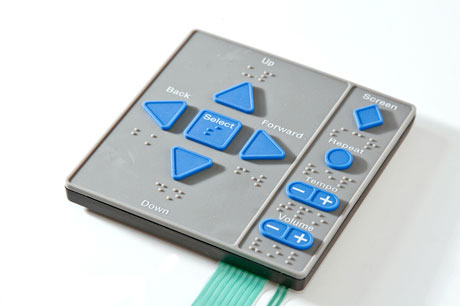How Membrane Switches Are Designed for Easy Maintenance and Repair
How Membrane Switches Are Designed for Easy Maintenance and Repair
Blog Article
Recognizing the Significance of Membrane Switches in User User Interfaces
Membrane switches are essential elements in the layout of efficient individual interfaces, assisting in not just functionality yet additionally boosting visual charm and user communication. As we check out the different advantages and future fads linked with Membrane innovation, it ends up being clear that these switches are more than simply parts; they stand for a convergence of development and usefulness.
What Are Membrane Buttons?

The spacer layer, which includes sticky residential or commercial properties, permits the separation of the circuit layer from the overlay, making sure that the switch continues to be in a non-activated state until pressed. When pressure is related to the overlay, it compresses the spacer layer, connecting the space and completing the circuit in the underlying layer. This design not only minimizes the physical room needed for traditional mechanical switches but additionally improves the durability of the tool, as Membrane switches are generally resistant to dust, moisture, and various other ecological elements.
Commonly discovered in applications ranging from consumer electronic devices to medical gadgets, Membrane buttons are important to modern-day technology, supplying a effective and easy to use interface that straightens with modern design demands.
Advantages of Membrane Switches
While numerous button innovations exist, Membrane Switches offer distinct advantages that make them particularly preferable in various applications. Among the primary advantages of Membrane switches is their compact layout, which enables space-saving applications in devices where realty is limited. Their thin profile not only improves aesthetic allure however likewise promotes lightweight construction.
One more significant benefit is their resistance to environmental aspects. Membrane switches are usually sealed against dampness, dirt, and contaminants, making them optimal for usage sought after atmospheres, such as medical devices and commercial equipment. This longevity prolongs the life expectancy of the button, reducing maintenance prices and enhancing reliability.
Moreover, Membrane switches can be customized to meet particular style needs, including distinct graphics and colors that improve individual interaction. Their responsive feedback alternatives can likewise be customized to give a satisfying individual experience. Additionally, Membrane buttons are affordable, specifically in high-volume applications, as they can be created effectively.
Applications in Different Industries

In the customer electronic devices field, Membrane switches prevail in gadgets such as microwaves, washing makers, and remote controls. Their tactile comments and visual choices boost customer experience while providing a streamlined, contemporary appearance. In addition, vehicle manufacturers make use of Membrane buttons in control panel controls and infomercial systems, where space is restricted, and customer interaction is crucial.
Additionally, the industrial industry leverages Membrane switches in control panels for equipment and devices, permitting for instinctive procedure in often extreme atmospheres. Their resistance to chemicals and wetness ensures longevity and reliability in these applications. On the whole, the flexibility of Membrane Switches adds significantly to their extensive use, making them indispensable in numerous technical domain names.
Design Considerations for Membrane Buttons

When developing Membrane buttons, several crucial considerations should be taken into consideration to make sure ideal functionality and user experience. First of all, the choice of products is vital; selecting resilient, top quality substratums can boost the switch's longevity and resistance to ecological factors such as wetness and temperature fluctuations.
Second of all, the design of the visuals overlay should focus on clarity and ease of usage. Icons and message need to be clear, and the layout ought to facilitate intuitive communication (membrane switches). Furthermore, tactile feedback is important; incorporating a responsive dome or various other devices can enhance the user experience by offering physical confirmation of activation
One more essential variable is the switch's electric efficiency. Developers need to ensure that the conductive traces are correctly made to reduce resistance and stay clear of signal interference. This includes analyzing the called for actuation pressure and guaranteeing compatibility with the electronic components they will certainly user interface with.

Future Patterns in Membrane Technology
As modern technology proceeds to advancement, Membrane switches are positioned to progress significantly, driven by advancements in materials and manufacturing techniques. One arising trend is the unification of advanced materials, such as adaptable substratums and conductive inks, which boost longevity and lower the overall weight of Membrane buttons. These products not only boost the responsive action however additionally permit the design of buttons that can withstand harsher ecological conditions.
Moreover, the assimilation of touch-sensitive modern technologies is changing traditional Membrane Switches into more interactive customer interfaces. Capacitive touch sensors embedded within Membrane button panels can provide a more user-friendly and receptive user experience, straightening with the growing need for streamlined, contemporary layouts in consumer electronic devices.
Additionally, Resources innovations in printing methods, such as electronic and 3D printing, make it possible for quick prototyping and customization of Membrane switches. This versatility enables suppliers to react extra rapidly to market needs and customer choices.
Finally, sustainability is coming to be a significant focus, with manufacturers checking out green materials and processes. As these trends unfold, the future of Membrane modern technology assures boosted functionality, aesthetic charm, and environmental obligation, strengthening their role in innovative customer interfaces throughout different markets.
Verdict
In final thought, Membrane Switches represent an essential component in the design of individual interfaces, combining functionality with aesthetic flexibility. Their benefits, including longevity and resistance to environmental factors, make them ideal for diverse applications across numerous sectors. Moreover, thoughtful layout considerations boost individual interaction and experience. As advancements in innovation proceed, the advancement of Membrane switches is expected to further fine-tune individual interfaces, driving technology and boosting use in a progressively complicated technological landscape.
Membrane switches see this are important components in the layout of efficient customer interfaces, facilitating not just functionality but additionally enhancing aesthetic charm and user interaction.Membrane Switches offer as a crucial element in various user interfaces, promoting a smooth communication in between users and digital tools.While many button technologies exist, Membrane Switches offer distinct advantages that make them especially desirable in numerous applications.Furthermore, Membrane switches can be personalized to satisfy details layout needs, incorporating special graphics and colors that improve individual communication.In final thought, Membrane Switches stand for a vital part in the design of individual interfaces, integrating functionality with aesthetic flexibility.
Report this page